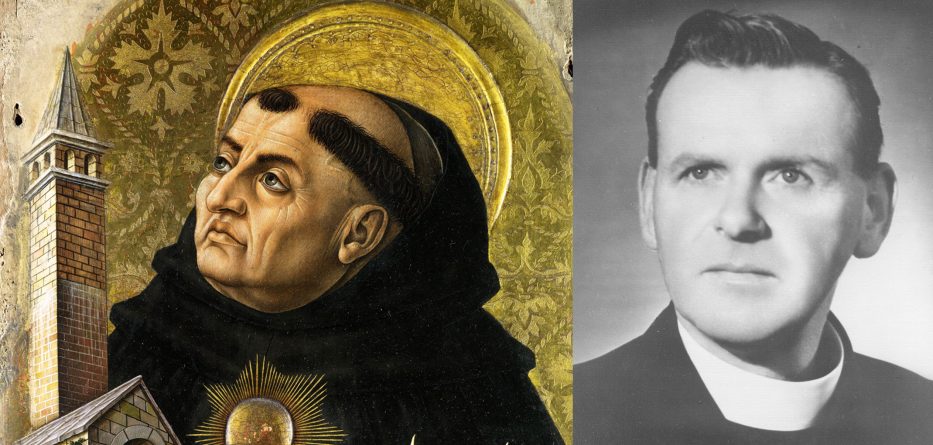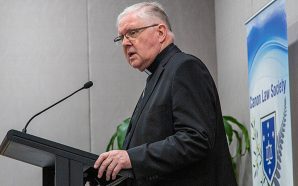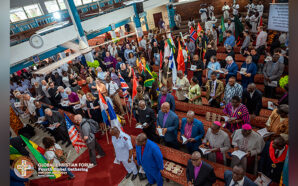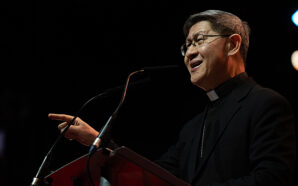Austin Woodbury Place is nestled in the quiet streets of Toongabbie, a hint of the little known history of one of Australia’s greatest philosophers, the Rev Dr Austin Woodbury SM.
This Thomist, a philosopher in the vast legacy of St Thomas Aquinas’ thought, was much loved and held in high regard internationally.
Dr Christine Wood, an international lecturer in theology, has conducted research on the Woodbury Collection in the Campion College Library.
“He was definitely one of Australia’s leading Thomistic thinkers in the 20th century,” Dr Wood told Catholic Outlook.
“He taught in a period that was heavily influenced by what is commonly called today ‘Neo-Scholasticism’ or ‘Neo-Thomism.’ After Vatican II, however, Catholic theology moved away from Neo-Scholasticism, and even Thomism in many quarters, because it was seen as too rigid and was perceived as a theological method that did not facilitate ready engagement with the modern world. This enabled other forms of theology and philosophy to flourish, with mixed results,” she said.
Professor James Franklin wrote in Catholic Values and Australian Realities (Connor Court, 2006) that Thomism, the philosophical school to which Woodbury belonged, continues to exert influence, notably through the magisterial teachings of the papacy.
“Pope John Paul II had the same thesis supervisor as Dr Woodbury and has never given any indication of doubting any of Aquinas’s doctrines (though unlike Woodbury he did add to his scholastic formation a serious study of certain twentieth-century philosophers),” Professor Franklin wrote.
Their thesis supervisor was Père Reginald Garrigou-Lagrange OP, Rector of the Pontifical Athenaeum Angelicum in Rome.
The Papal encyclical Veritatis Splendor, ‘The Splendour of the Truth’, explicitly refers to the natural law, an important part of scholasticism and a foundation of much recent Catholic moral philosophy and theology.
“The basics of scholastic philosophy, especially its views on the natural law foundation of ethics, are right and we cannot do without them,” Professor Franklin wrote.
From 1938 to 1943 Dr Woodbury was the founding Rector of Blessed Peter Chanel’s Seminary, Toongabbie, according to the Australian Dictionary of Biography. Today, the building is home to Campion College Australia and St Peter Chanel has been canonised.
In 1945, Dr Woodbury founded the Aquinas Academy, a pioneering enterprise to teach philosophy to lay Catholics.
At its peak, 500 students would attend the evening classes throughout the week to hear lectures from the commanding ‘Doc’, as he was nicknamed.
Dr Woodbury was noted for taking on prominent atheist professor of philosophy, John Anderson. Their rivalry was described as a ‘Cold War’.
“He showed remarkable penetration as an interpreter of Thomist metaphysical principles,” Rev Dr John Thornhill wrote. “His incisive and entertaining expository style made philosophy’s subtleties intelligible to the uninitiated.”
“Communicating his own enthusiasm, he inspired several of his students to obtain doctorates abroad. He made a great impact upon the narrow outlook of Sydney Catholicism. His students came from all walks of life, including the professions and the universities,” he wrote.
“His clear style enabled him to plumb the depths of philosophical issues ranging from the nature of knowledge, to the freedom of the will, to the existence of God,” Dr Wood said.
His legacy lives on in associated institutions, such as Dr Raphael Waters’ Aquinas School of Philosophy, New York, The Centre for Thomistic Studies, Sydney, the Aquinas Academy, the Austin Woodbury Archive at Campion College Australia, the late Sr Maur Woodbury’s Holy Family Education Centre and former students, such as Rev Dr John Thornhill SM, member of the Congregation for the Doctrine of the Faith’s International Theological Commission from 1980 – 1985.
Sources
Franklin, J, 2003, Corrupting the youth: a history of philosophy in Australia, Macleay Press, Sydney.
Franklin, J, 2006, Catholic values and Australian realities, Connor Court Publishing, Bacchus Marsh.
John Thornhill, ‘Woodbury, Austin Maloney (1899–1979)’, Australian Dictionary of Biography, National Centre of Biography, Australian National University, http://adb.anu.edu.au/biography/woodbury-austin-maloney-12066/text21645, published first in hardcopy 2002, accessed online 22 March 2018.








